Youth take pride in celebrating Philippine Resistance
Youth take pride in celebrating Philippine Resistance
By Dyan Ruiz
TORONTO–Celebrating Filipino resistance against oppression was the key message shared by youth through high-energy music, rap songs and spoken word acts, workshops, and displays at the first major event by Anakbayan Toronto.
“Diwa Ng Kasarinlan 2012” on the afternoon of July 7 at Ryerson University featured young Filipino-Canadians sharing their pride through music, poetry and discussions. The event targeted at youth also encouraged participants to explore the roots of Philippine oppression by understanding more about Spanish colonialism and American imperialism and modern-day struggles.
“Filipino pride was earned by the many, many brave women and men who fought for it through action,” said Alex Felipe to the audience, “Patriotic pride is borne in this struggle– in the fact that even under the gravest odds we fight.”
The event’s lead organizer, Jesson Reyes, said that Diwa 2012 was “an independence day event” that was held on July 7 because it commemorates the 120th anniversary of the founding of the Katipunan. The Katipunan was a revolutionary society formed in 1892 that fought for independence of the country from Spain. Reyes said this day is more emblematic of Philippine independence than June 12, the traditional holiday.
Anakbayan partnered with the hip-hop group, Southeast Cartel, for the event and they acted as co-emcees with Rhea Gamana and closed the show. Their conscious hip-hop mainly in Tagalog brought a lot of new faces among those who regularly attend political events. Throughout the day, a crowd of approximately 100 mostly youth were in attendance, many wearing the new Anakbayan Toronto t-shirts.
Red and white banners stamped with Anakbayan’s logo streamed across the main room, making the large event space at Ryerson’s Student Centre look like a barangay fiesta.
Women from Migrante Canada broke out in line dancing throughout the youth performances and were dubbed the event’s “backup dancers.” Bridge Dang-ay said she was “elated by the active participation of the youth,” especially their “electrifying performances.” She said it was only at this event that she saw “the full force of talent of young Filipino people here, so they made me dance! They made me rock on!”
Belinda Corpuz of Philippine Advocacy through Arts and Culture (PATAC) kicked off the performers and speakers with a song. Performances included the impassioned spoken word poetry of Faye Estrella from Ottawa, the caramel tones of singer Alexander The on acoustic guitar, and alternative rock wails of J’NAI.
Artists from other communities came out to show solidarity with Filipino migrant issues. In the spoken word piece by Guatemalan-Canadian artist, Spin, he said, “we wouldn’t cross these borders if these borders didn’t cross us,” referring in part to the activities of Canadian mining companies in rural areas in the Philippines, South America and throughout the globe.
Rapper, Noel “Fenaxiz” Matta, who performed his new song “White Man’s Burden” named after the poem by Rudyard Kipling justifying the American colonization of the Philippines said he remembers when he was younger and didn’t have a lot of exposure to Filipino culture. With events like this by Anakbayan, youth can strengthen their pride and understanding, which is “good because it gets them talking,” he said.
Philippine history boards were posted throughout the event space, and some evoked strong reaction from participants. “That’s some of the most racist sh*t I’ve ever seen!” said 23-year-old Scott Ramirez about a 1902 photograph of a young Filipino girl on display at Coney Island. “How you gonna show a human being like that?” he said.
Ramirez continued to say he appreciated the information they had on pre-colonial Philippines. “It’s good that Filipinos do their own research in their own culture and know that we’re not naked savages with no culture,” he said, “We were trading with Indians and Chinese. We were an advanced culture.” This is unlike the educational CD Ramirez had as a child about explorers such as Columbus and Magellan that depicted native cultures as backwards and barbaric. The event also raised his awareness on other issues he’s not that familiar with, such as the plight of overseas foreign workers.
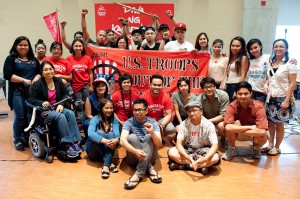
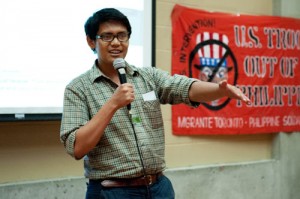
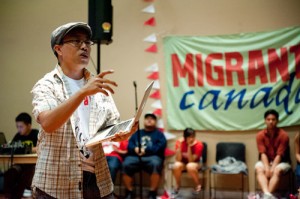
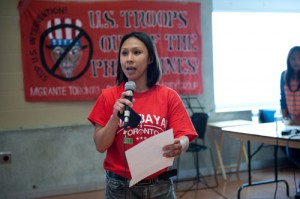
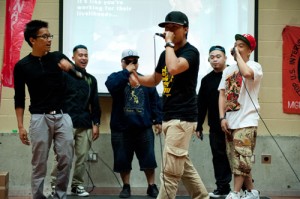
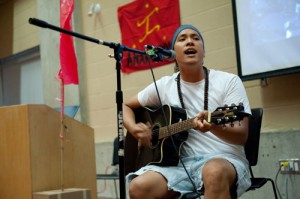
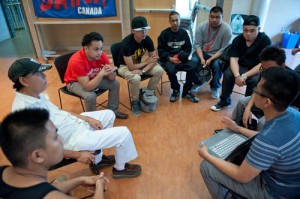
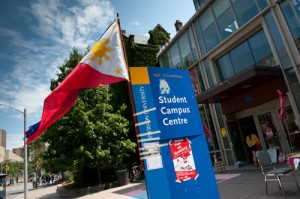
Comments (0)